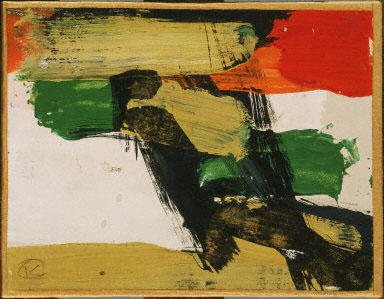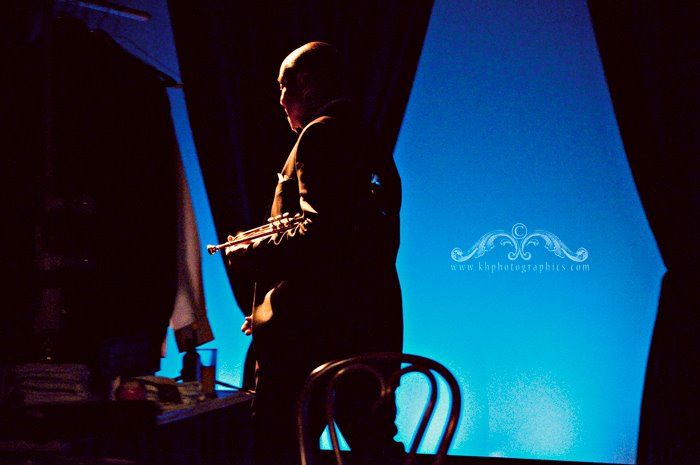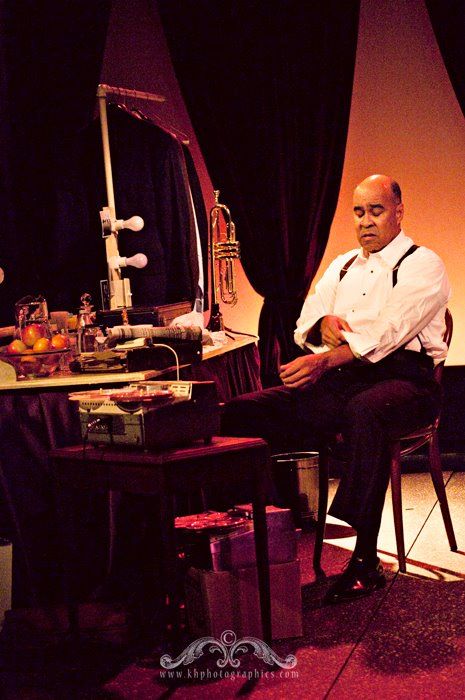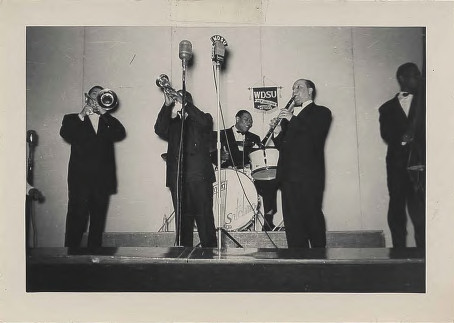“Men are seldom more commonplace than on supreme occasions.”
Samuel Butler, The Note-Books of Samuel Butler
Archives for September 2011
TT: Comfort and joy
This summer has been far too much of a muchness: too much travel, too much work, too much stress. Mrs. T and I had planned to take a week off, but our plan was scrapped when my mother fell ill, and I ended up going straight from reviewing shows all over the country to opening one of my own in Florida. By the time I arrived in Washington, D.C., on Monday, I was as frazzled as I’ve ever been.
 Fortunately, the friend with whom I had dinner that evening took one look at me and insisted that I do something just for fun as soon as humanly possible, so I strolled over to the Phillips Collection the next day and spent an hour looking at paintings. Not only had a month gone by since my last walk–that’s how busy I’ve been–but I hadn’t set foot in my favorite museum for two years. It wasn’t that I’d forgotten how much I love the Phillips, but I confess to having been startled by how comforting it was for me to visit its galleries after so prolonged an absence. No sooner did I find my way to Paul Klee’s Arrival of the Jugglers than I felt the world start to right itself.
Fortunately, the friend with whom I had dinner that evening took one look at me and insisted that I do something just for fun as soon as humanly possible, so I strolled over to the Phillips Collection the next day and spent an hour looking at paintings. Not only had a month gone by since my last walk–that’s how busy I’ve been–but I hadn’t set foot in my favorite museum for two years. It wasn’t that I’d forgotten how much I love the Phillips, but I confess to having been startled by how comforting it was for me to visit its galleries after so prolonged an absence. No sooner did I find my way to Paul Klee’s Arrival of the Jugglers than I felt the world start to right itself.
Henri Matisse made an oft-quoted remark about his art that deserves closer consideration than it tends to get:
What I dream of is an art of balance, of purity, and tranquility, without any disquieting or preoccupying subject matter, an art that could be for every mental worker, for the businessman as well as the man of letters, for example, a tonic, a cerebral calmative, something like a good armchair that relaxes him from his physical fatigue.
Those of us who spend our lives immersed in the world of art have an unfortunate way of overlooking its unique ability to serve as a remedy for the trials of life. We think of art as something to do, not something to use, and many of us also suffer from the mistaken notion that art must be challenging in order to be good. On some level, of course, that’s perfectly true, but there are many different ways of experiencing art, all of which are valid as far as they go. (There are nine and sixty ways of constructing tribal lays,/And every single one of them is right!) To take uncomplicated pleasure from beauty is a wholly worthy activity, and to do it in the hope of finding surcease from whatever may be troubling us is no less worthy.
 One of the reasons why I love the Phillips is because it never fails to surprise me. Today I ran across a small untitled painting by Franz Kline that I’d never seen before, and I delighted in its unpredictability. Who knew that Kline, that most monochromatic of modernists, could make such startling use of color? But I’d come to the Phillips to rest my spirit, and as I gazed at The Open Window and The Garden at Les Lauves for the umpteenth time, I felt the calm of which Matisse spoke, the comfort of great art whose idiosyncrasies are as familiar as the quirks of an old friend.
One of the reasons why I love the Phillips is because it never fails to surprise me. Today I ran across a small untitled painting by Franz Kline that I’d never seen before, and I delighted in its unpredictability. Who knew that Kline, that most monochromatic of modernists, could make such startling use of color? But I’d come to the Phillips to rest my spirit, and as I gazed at The Open Window and The Garden at Les Lauves for the umpteenth time, I felt the calm of which Matisse spoke, the comfort of great art whose idiosyncrasies are as familiar as the quirks of an old friend.
I returned to the hotel refreshed, took a nap, then went to the Studio Theatre to see a new play, one to whose newness I would surely have been unequal had I not spent the afternoon communing with Bonnard and Cézanne. Today I return to Connecticut and Mrs. T, and I dare say I’ll appreciate her even more than usual, too. There are worse reasons to go to museums–or to make art.
TT: Snapshot
Home movies of Arnold Schoenberg, taken in 1937 by George Gershwin:
(This is the latest in a weekly series of arts-related videos that appear in this space each Wednesday.)
TT: Almanac
“The composer is seldom a great theorist; the theorist is never a great composer. Each is equally fatal to and essential in the other.”
Samuel Butler, The Note-Books of Samuel Butler
TT: We should all be so lucky
From the 1976 Tony Awards telecast, the original cast of A Chorus Line performs “I Hope I Get It”:
TT: Almanac
“The supposition that the world is ever in league to put a man down is childish. Hardly less childish is it for an author to lay the blame on reviewers. A good sturdy author is a match for a hundred reviewers.”
Samuel Butler, The Note-Books of Samuel Butler
TT: Waving goodbye
 Mrs. T and I saw the Sunday matinee of Satchmo at the Waldorf in Orlando, then joined the cast and crew for homemade gumbo. Today we’ll drive to the Orlando airport and go our (temporarily) separate ways, she to Connecticut and I to Washington, D.C., where I’ll be seeing the American premiere of Alan Bennett’s The Habit of Art on Tuesday. I hate to leave my own show behind, but duty calls, and at least I got to see the first four performances.
Mrs. T and I saw the Sunday matinee of Satchmo at the Waldorf in Orlando, then joined the cast and crew for homemade gumbo. Today we’ll drive to the Orlando airport and go our (temporarily) separate ways, she to Connecticut and I to Washington, D.C., where I’ll be seeing the American premiere of Alan Bennett’s The Habit of Art on Tuesday. I hate to leave my own show behind, but duty calls, and at least I got to see the first four performances.
I’ve learned a lot in the past week and a half. Watching Rus Blackwell direct my play was an education in itself. I liked what he did so much that I’ve already written into the script several pieces of business that were devised by Rus. William Elliott, who designed the set and lighting, went to enormous trouble to create an evocative space that drew the audience in, and we had the supreme pleasure of working with a fabulous crew. Many, many thanks to Holly Bennett, Cindy Karr, and Jamie Mykins, who made all the rough places plain.
As for Dennis Neal, there aren’t enough words in the English language to describe what he did with the double role of Louis Armstrong and Joe Glaser. All I can say is that as I sat in the theater, I said to myself, “My God, he looks like Satchmo now—and they don’t even look alike!” The last time I saw an actor bring off so radical a transformation was when Frank Langella starred in the Broadway transfer of Frost/Nixon. Dennis is a true artist, and I’ve never been luckier in my life than when Rollins College brought us together in February to do the first public reading of Satchmo at the Waldorf.
 Rus and Dennis cut a thousand words out of the play during the first week of rehearsals. I realized as soon as I got to Orlando that the script was much the better for having been tightened up so judiciously. I made some additional cuts of my own, and by the time we opened on Thursday, the pacing was right where I wanted it to be. It was fascinating to see how the audience’s response varied from night to night. The opening-night crowd laughed so loudly at the first act that they could have been watching Noises Off. On Friday, by contrast, the play was received with total seriousness and involvement, as if it were a deadly serious drama (which, of course, it is, the punch lines notwithstanding). Much to my delight, Dennis was quick to pick up the mood of the house each night and shape his performance accordingly. That’s professionalism.
Rus and Dennis cut a thousand words out of the play during the first week of rehearsals. I realized as soon as I got to Orlando that the script was much the better for having been tightened up so judiciously. I made some additional cuts of my own, and by the time we opened on Thursday, the pacing was right where I wanted it to be. It was fascinating to see how the audience’s response varied from night to night. The opening-night crowd laughed so loudly at the first act that they could have been watching Noises Off. On Friday, by contrast, the play was received with total seriousness and involvement, as if it were a deadly serious drama (which, of course, it is, the punch lines notwithstanding). Much to my delight, Dennis was quick to pick up the mood of the house each night and shape his performance accordingly. That’s professionalism.
Satchmo at the Waldorf runs through October 2. After that…well, who knows? Dennis and Rus want to produce it elsewhere, which would suit me right down to the ground. But no matter what happens in the future, I can say with pride that in addition to being a critic, biographer, and opera librettist, I’m now a full-fledged professional playwright. I went into the arena and came back in one piece. Like the song says, they can’t take that away from me!
* * *
Here’s a lovely picture of Armstrong’s original All Stars, taken on stage in New Orleans in 1949:

TT: Just because
Frank Sinatra and Peggy Lee sing “Nice Work if You Can Get It”:
